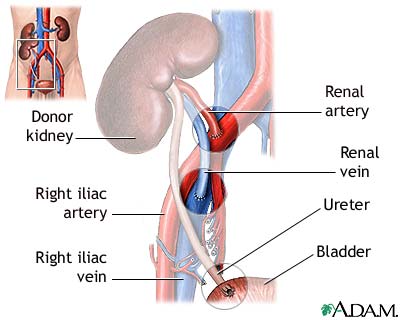
Newswise — the presence of certain markers in the urine might be a red flag for acute kidney injury (AKI), according to a study appearing in an upcoming issue of the Journal of the American Society Nephrology (JASN). the results suggest that a simple urine test could help prevent cases of kidney failure.
Unlike heart or brain injuries, which show obvious outward signs, physical symptoms are not typically present with AKI. Researchers have been looking for markers of AKI, with the hope that early detection will lead to early therapy to prevent kidney failure. Richard Zager, MD (Clinical Research Division, Fred Hutchinson Cancer Research Center) and his colleagues investigated whether certain molecules that are produced during injury and infection might be excreted in the urine and serve as diagnostic markers. Specifically, they measured the diagnostic potential of monocyte chemoattractant protein-1, a protein that plays a role in recruiting immune cells to injured or infected sites in the body. This protein has been found in the joints of people with rheumatoid arthritis and in the urine of people with lupus.
The investigators found elevated levels of monocyte chemoattractant protein-1 as well as its mRNA (the template for protein synthesis) in urine samples from both mice and human patients with AKI. This suggests that the gene that encodes this mRNA and protein is activated in patients with AKI. Using a new technique, known as chromatin immunoprecipitation assay, the investigators were also able to show changes in proteins (known as histones) that can activate the gene that produces MCP-1. This is the first time that the ability to detect these protein modifiers have been identified in human urine samples.
“This is a new diagnostic test that provides information about what processes are actually inducing acute kidney injury; however, a much larger prospective study is required to ultimately determine clinical utility,” said Dr. Zager.
Study co-authors include Raj Munshi, MD (Seattle Children’s Hospital and Regional Medical Center); Ali Johnson, PhD (Fred Hutchinson Cancer Research Center); Edward Siew, MD, T. Alp Ikizler, MD, Lorraine Ware, MD (Vanderbilt University Medical Center); and mark Wurfel, MD, and Jonathan Himmelfarb, MD (University of Washington).
Disclosures: the authors reported no financial disclosures.
The article, entitled “MCP-1 Gene Activation Marks Acute Kidney Injury” will appear online at jasn.asnjournals.org/ on November 11 2010, doi 10.1681/ASN.2010060641.
The content of this article does not reflect the views or opinions of the American Society of Nephrology (ASN). Responsibility for the information and views expressed therein lies entirely with the author(s). ASN does not offer medical advice. all content in ASN publications is for informational purposes only, and is not intended to cover all possible uses, directions, precautions, drug interactions, or adverse effects. This content should not be used during a medical emergency or for the diagnosis or treatment of any medical condition. please consult your doctor or other qualified health care provider if you have any questions about a medical condition, or before taking any drug, changing your diet or commencing or discontinuing any course of treatment. Do not ignore or delay obtaining professional medical advice because of information accessed through ASN. call 911 or your doctor for all medical emergencies.
Founded in 1966, the American Society of Nephrology (ASN) is the world’s largest professional society devoted to the study of kidney disease. Comprised of 11,000 physicians and scientists, ASN continues to promote expert patient care, to advance medical research, and to educate the renal community. ASN also informs policymakers about issues of importance to kidney doctors and their patients. ASN funds research, and through its world-renowned meetings and first-class publications, disseminates information and educational tools that empower physicians.
Comment/Share